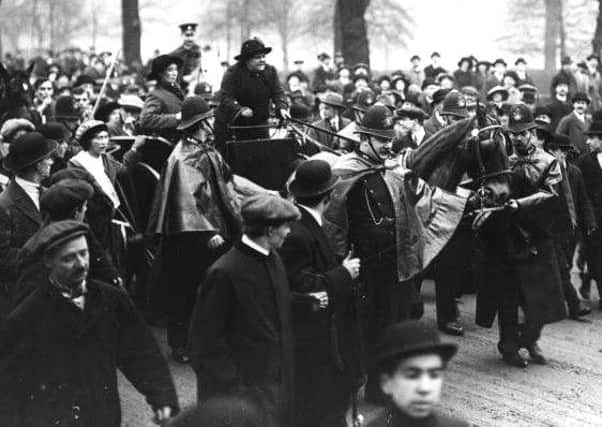Tom Peterkin: The one issue that shows our MSPs at their edifying best


Sitting down to write a column on Ash Wednesday, vague and woolly thoughts of self-denial begin to flit across the neurones and synapses. As ever at this time of year, the question of what one should give up for the 40 days and nights that make up Lent raises its ugly head.
In the case of this weak-willed individual, a typically feeble answer winged its way through the grey matter … absolutely nothing … as usual. Giving up booze would be too boring/too difficult/too downright impossible. As a non-smoker giving up the fags doesn’t really count. While a Lenten chocolate ban isn’t even worth contemplating.
Advertisement
Hide AdAdvertisement
Hide AdMore manageable would be following the example of a drouthy colleague, who once proudly announced he was giving up tonic for Lent (no mention of the gin). Mind you, this was the same person who expected congratulations for attempting a “dryish” January.
But really what’s the point? Such token gestures hardly seem a worthy homage to the 40 days and nights Jesus spent fasting in the desert and resisting temptation.
Such pathetic notions of self-sacrifice are also profoundly pitiful in comparison to a subject that was under discussion in the Scottish Parliament before it broke up this week for the February recess. At Holyrood, the 100th anniversary of women getting the vote was marked in a way which was greatly to the parliament’s credit. During one of the best debates of its type, MSPs cited breathtaking examples of the genuine self-sacrifice made by Scottish suffragettes and suffragists in the early years of the 20th century.
Not all Holyrood sessions are both edifying and interesting, but this one most certainly was. Ruth Davidson of the Tories and Ruth Maguire of the SNP spoke of the Ayrshire suffragette Flora “the General” Drummond, who earned her nickname by campaigning on the back of a huge charger.
Apparently she once managed to slip through the door of 10 Downing Street as she advanced her cause. Like others, she was imprisoned and force fed – a particularly cruel and harmful practice. Clearly a woman of exceptional initiative, she taught Morse code to her fellow prisoners. Via the SNP’s Christina McKelvie and Jenny Gilruth, we learnt of the courage of Ethel Moorhead, who was the first Scottish suffragette to be force fed. A lady of considerable spirit, Ms Moorhead once threw pepper in the face of a policeman when protesting at a meeting in Fife attended by the then Prime Minister Herbert Asquith. She was taken to Methil police station where she smashed all the windows, turned on the water to flood the jail, before throwing a bucket of water over another policeman. On another occasion, she threw an egg at Winston Churchill when he was in her home city of Dundee.
Churchill’s initial lack of enthusiasm for votes for women often led to him getting a frosty reception in Dundee, where he stood as Liberal MP. When campaigning in the Juteopolis in 1908, the Irish suffragette Mary Maloney followed him for a week, ringing a large bell whenever he started to speak.
The SNP’s Joan McAlpine told the story of Prime Minister Asquith and his Home Secretary Reginald McKenna playing a round of golf on Dornoch links. The match had reached the 10th green when they were accosted by Lilas Mitchell, from Leith, and Elsie Howie, one of the first female St Andrews University graduates. Miss Mitchell shouted: “Mr Asquith you are responsible for forcibly feeding and torturing our women!” The Home Secretary attempted to push her away. A detective appealed for help from the caddies.
According to a newspaper report of the incident: “The caddies were evidently finding some enjoyment in this departure from the routine of their work and failed to make any response.”
Advertisement
Hide AdAdvertisement
Hide AdIt was, said Ms McAlpine, a “gesture of solidarity from local working-class men who probably did not have the vote either”.
Another woman to take the campaign on to the golf course was the pioneering journalist Caroline Phillips. Her impressive contribution to the votes for women movement was recalled by the SNP’s Gillian Martin. Ms Phillips’s campaigning activities irritated her bosses at the Aberdeen Daily Journal, where she was one of the first female journalists. So much so that management wrote to her to say that her commitment to the suffragette cause was putting her job at risk. Undeterred, she continued to use the newspaper offices and stationery for campaigning. One of her acts of protest was to go round the Balmoral golf course replacing the flags with the colours of the Women’s Social and Political Union. Accompanying these these tales of doughty battlers for women’s rights ran the theme that the fight they fought with such distinction was still a work in progress. Gender inequality still exists in the work place. For evidence of that look no further than the 14,000 Glasgow City Council workers involved in a bitter battle over a system that sees people in female-dominated roles paid up to £3 an hour less than people in male-dominated ones.
With the gender pay gap standing at seven per cent in Scotland and with women comprising just 27 per cent of board members in big UK companies there is much to be done.
If they can display a fraction of the moral fibre and self-sacrifice that was so evident in Scotland’s suffragettes, today’s politicians should be able to finish the job 100 years on.
Perhaps that is something for lesser mortals to mull over during yet another Lent marked by self- and over-indulgence.
